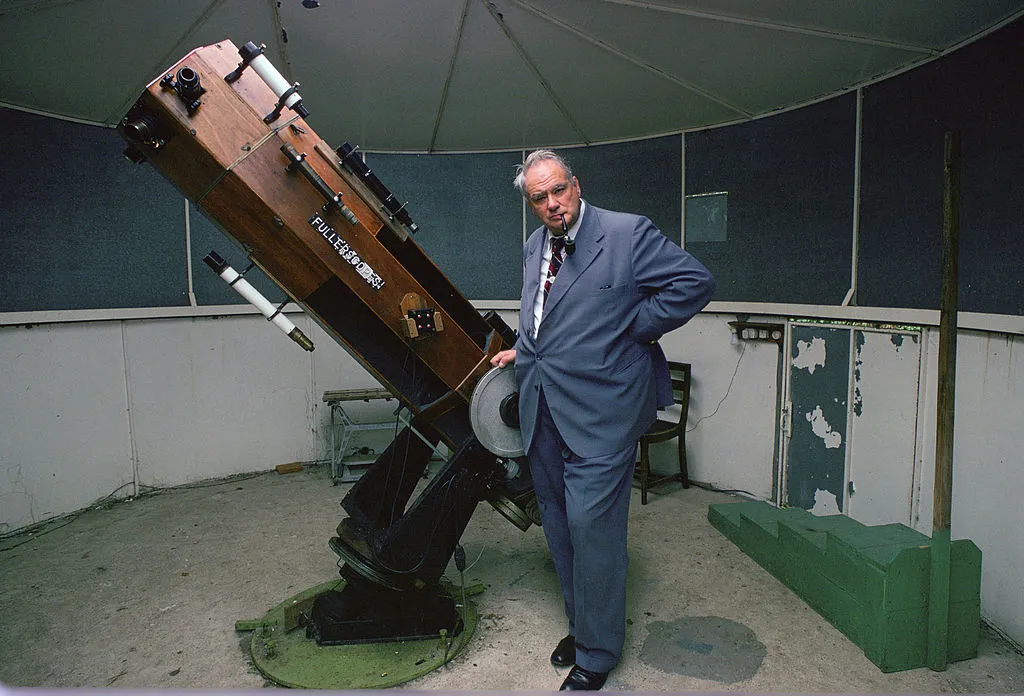As a young astronomer, what advice were you given by Patrick Moore?
Well I’d been interested in astronomy for a good number of years and knew I needed a larger telescope to do things properly, but I really didn’t know anyone to get advice from.
The only person I could think of was Patrick Moore – care of the BBC.
Of course, my parents never thought for a moment that I’d get a letter back, but eventually I received a four-page personally typed reply.
The final paragraph went something like; “Well having said all that, probably the best thing to do is for you to come down to Selsey for a weekend.
I could show you all my telescopes and we could have a proper talk about it.”
As my grandmother lived down the road at that stage, we took him up on his offer.

At Patrick’s home, his mother regaled me with stories including one about the amazing, redoubtable but now sadly lung-cancer-defeated Woody – their former housekeeper. It was an extraordinary household.
I read some of his books, and that night we did see a very hazy Jupiter.
It wasn’t a clear night, but it was still an eye-opener for me because it was the first time I’d ever seen that much detail on a planet.
This all made me very enthusiastic, and then at Sevenoaks School, where I was studying, some friends, our physics teacher, and myself built a telescope and observatory which Patrick came to open for us.
So he was a feature of your formative years?
All through my formative years, that’s absolutely right. I used to go and listen to him at BAA talks in London.
Do you know of any other scientists who had similar encouragement?
A few years ago I came across Rodney Townsend who had had precisely the same story as me.
The two of us wondered how many others there were who had followed scientific careers that were, at least partly, inspired by interactions with Patrick.
Rodney and I have been scratching our heads to find out how we might find some as we’re absolutely convinced that they exist.
I’ve met quite a few people who’ve said they’ve been inspired by Patrick early on in their amateur observing career.
Absolutely. He’s hugely encouraging to people interested in pursuing amateur science.
How important do you think it is for young people to receive the kind of advice you did from Patrick?
It’s transformational.
Nine times out of 10 if you ask someone why they’re a scientist, there’s always an inspiring individual somewhere in their past.
It might have been a schoolteacher, it might be a parent, it might be a figure like Patrick, but it always makes the difference.
Science is fundamentally a very human activity.
One of the sadness’s I have with the way science is handled in the media is that it’s often put in a rather dehumanised box.
I believe that it’s absolutely fundamental to our souls to want to know how the world works.
And when that’s met by the enthusiasm and open-ended can-do-ness of someone like Patrick, it’s a winning combination.
How did Patrick’s encouragement translate in to your current research area, material physics?
It’s an interesting story. I’d wanted very much to do astronomy; my plans were to become an astronomer.
I actually have a paper in The Astrophysical Journal.
So I had a great interest in the subject, but at the same time I’d also been keen to discover science and industry.
I’d had a gap year working for Courtholds in their polymer laboratories, and found it absolutely fascinating.
I finally decided to go down the polymer physics route when I discovered that Sam Edwards and his group at Cambridge had uncovered the first proper molecular theory of viscoelasticity.
I had the impression that there must be some real physics under this somewhere providing someone could find it out.
Then, in my undergraduate final year at Cambridge, I discovered that the fundamental equation had been worked out.
I decided to take my career in the direction of a science that was in its infancy when there was everything to play for, keeping astronomy as a hobby.
Has Patrick Moore inspired you to follow a career in science, or take up astronomy as a hobby? If so, get in touch at contactus@skyatnightmagazine.com.